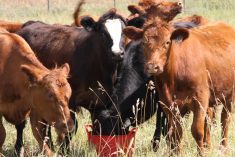ROCKY MOUNTAIN HOUSE, Alta. — Widespread feed shortages could make it tough for cattle producers to find enough supplies at affordable prices this winter. That makes waste prevention more important than ever.
Storage sheds are ideal but many producers leave bales outside and that can affect nutritional value.
Round bales left outside lose their shape over winter, said beef specialist Barry Yaremcio of Alberta Agriculture.
When bales deteriorate, protein and soluble carbohydrates are lost, he said at a Grey Wooded Forage Association feed workshop.
Read Also

The Western Producer Livestock Report – November 6, 2025
Western Producer Livestock Report for November 6, 2025. See U.S. & Canadian hog prices, Canadian bison & lamb market data and sales insights.
There is often a layer of spoilage on the outside layers and cows refuse to eat it.
Pyramid stacks end up with the most damage because moisture enters and starts to work its way through the bales.
Mushroom stacks are better where the bottom bales take the damage.
Staking single bales in rows with spaces of four to six inches between the bales is the best storage method and results in the least damage.
Waste from bale processors and feeders is also common.
Studies on bale processors on meadow brome hay showed 19.2 percent feed loss, which means a 30 percent protein loss and 23 percent calcium loss. Fine stems, flowers and leaves can also be lost.
A bale unroller accounts for about 12.5 percent loss.
Waste from bale feeders depends on the design and how much cows drop on the ground. Losses range from three to 20 percent.
Silage on snow could cause 25 to 35 percent feed loss under controlled experiments.
“If you are feeding full silage on the snow you are probably looking at a 35 percent loss,” he said.















